The Full Bryan Johnson Story: What's the real purpose of Blueprint?
Misleading promises, misrepresented studies, withheld data ... a thorough examination of Bryan Johnson
Last year, Bryan Johnson embarked on an Indiana Jones-esque adventure to a secret island “for an extreme medical procedure that could change the future of humanity.” In a video on his Youtube channel, Bryan detailed the incredible story of how he flew all the way to Roatán, an Island in Honduras “shrouded in mystery” in “search for the fountain of youth.” As Bryan traverses his way through airports and roads, he reminds us that “this could be the most powerful anti aging therapy [he’s] ever received.”
So what happened? Did it change the future of humanity? Well, four months later, Bryan said “we have yet to prove any upside.” Maybe it takes a couple more months for Bryan to start aging in reverse like Benjamin Button.
Bryan took a chance at something big and it didn’t pan out. So, why criticize him? Well, this pattern of making grandiose statements before the data is in is how Bryan spins up these big exciting stories that get people engaged with the Bryan Johnson brand. On the podcast FLAGRANT, Bryan said that “this is the first moment where we can say death is a maybe.” How exciting. But what is this based on? Scientists have never made a monkey, rat, mouse, reptile, fly or yeast immortal, so why can we suddenly say death is a “maybe?” These grandiose maybe’s of Bryan’s are a big part of the Bryan Johnson story and his marketing. Bryan doesn’t just make grandiose claims about what could happen, he makes such claims about what he is already achieving. Recently, he declared himself “the healthiest person on the planet” and to back this up, he claims he has “the best comprehensive biomarkers of anyone in the world.”
In this article, we’ll we’ll dig into:
・Whether Blueprint was really just a personal experiment or a money-making venture from the start
・The misleading promises and stories of Blueprint
・How Bryan misrepresents studies
・Why it's unlikely that Bryan is actually transparent with all his data
・How Blueprint’s own test results suggest their supplements shouldn’t have been shipped
・How Bryan pulled a switcheroo on his Rejuvenation Olympics for better press for himself
・How Bryan casually fearmongers to sell his products
This is a long one, so you may want to listen to the included voiceover (39:55)
Rob Rhinehart, the man with a vision for the future
First off, to understand Bryan Johnson, you need to understand Rob Rhinehart. To understand Rob Rhinehart, you need to understand Steve Jobs. If you recall that Steve Jobs had an amazing knack for making each new Apple product seem like a new technological revolution, then we can skip to Rob Rhinehart.
Back in 2014, Rob Rhinehart launched a completely new, potentially revolutionary product called Soylent. Actually no, it wasn’t new at all, it was just a meal replacement shake. Brands like Ensure have been making products just like it for decades. Yet everyone was covering the story with headlines like The Atlantic’s The Man Who Would Make Food Obsolete, The New Yorker’s THE END OF FOOD, or VICE’s This Man Thinks He Never Has to Eat Again.
The Youtube channel Motherboard even made a mini-documentary on Soylent which has amassed 4.1 million views.
So, why did Soylent generate so much hype when all kinds of meal replacement shakes, protein bars and so on had existed well before Soylent?
Well, let’s take a look at the intro to that Motherboard video:
Rob Rhinehart: “I think humanity is going to continue to grow. Everybody eats, and everyone needs energy, and these constraints are only going to get tighter. We’re going to have to take our understanding of the body and nutrition, design something new, and make something man-made for humanity.”
Brian Merchant (of Motherboard): “This is Soylent. Some people are calling it the future of food. I’m going to meet the man who invented it, find out how it might change the way we eat, and live on Soylent alone for 30 days straight.”
Wow. An exciting vision of the future where the needs of humanity have evolved. Of course, this vision is being painted by the very man who had the brilliant foresight to create a solution you can buy. Though, I shouldn’t paint Rob as someone who just wanted an avenue to sell a product. This was a product he truly believed in - he used himself to test it out, he lived off of only Soylent for 30 days to prove to himself the power of Soylent.
According to their Apple-esque marketing video, Soylent began as a mission to create the “ultimate food.” They didn’t want to replace food, they wanted to provide you with a better alternative to what people usually eat. Rhinehart explains in the video that in order to properly understand what they’re doing, you need to shift your perspective to realize that food is in fact just made out of chemicals, so it can be broken down and built back up so we can make it “better.”
The Soylent stock hit an all time high of $105 in December 2014 and now it’s at 7 cents. The company’s marketing has evolved to be …just like any other meal replacement shake. Soylent isn’t something superior to food that will completely replace it, today, it’s simply something that will “take a few things off your plate.”
Bryan Johnson, the world’s healthiest man with a revolutionary vision for the future
Bryan Johnson’s revolutionary vision for the future is quite clear from his tagline Don’t Die and his twitter profile: “conquering death would be humanity’s greatest achievement.” Like the meal replacement shakes, people promoting longevity enhancing lifestyles have been around for decades. Most promoters of this or that diet will inevitably make some claim about how their diet will not only improve your health but will make you live longer. This is of course a selling point of the vegan diet, which is the diet that Bryan Johnson does.
Though, there have been tons of vegan influencers throughout the years. Why is it that Bryan was able to get millions of followers, countless podcast appearances and even his own Netflix documentary? Bryan was able to turn himself into the perfect story for social media with the help of a very talented marketer. The “marketing genius behind Bryan Johnson,” Kate Tolo said in an interview that “storytelling is the only thing that matters” when it comes to viral marketing.
The Bryan Johnson story took off really quickly since Bryan created all sorts of angles to be the guy who…
・The guy who’s spending $2 million a year to not die
・The guy who took his 17 year old son’s blood to live forever
・The guy who removed all the plasma from his body
・The guy with the ‘world record’ for epigenetic age reversal
・The guy who edited his DNA on a secret island
・The guy who is 47 but has the ‘erections of an 18-year-old’
It’s like his life can be described in Youtube video titles.
Bryan initially advertised his Blueprint protocol as a project where he becomes the ultimate guinea pig for the betterment of humanity. He laid out his meticulous diet and lifestyle in many articles and videos, explaining that ‘every calorie has to fight for its life’ to be in his diet. Then, he posted the entire protocol and all his measurements on his website for free in case anyone wanted to try Blueprint for themselves. Many commenters were very appreciative of Bryan, applauding him for his transparency and for not ‘trying to sell them anything.’
To be honest, I was really interested in the Bryan Johnson story and noticed he was getting a lot of things right. He seemed to be getting a lot more people interested in health and longevity and even encouraged them to get better sleep. There was a lot of things to like about Bryan and I wanted to see where his self-experimentation would take him. Though, once he started using his personal story and grandiose claims about longevity to sell a line of supplements and meal replacements, I got curious about his motivations.
Bryan emphasized himself that indeed, he didn’t initially go into this with any intent to make money. After all, Bryan was also the guy who ‘sold his company for $800 million dollars,’ it’s not like he needed more money. He said on the More Plates More Dates podcast:
“When I started the project I had no incentive to make money. It was legitimately a scientific experiment. I didn’t do anything commercially for 2 years, then it blew up and one of the most common requests we got was make this easy.”
The only odd thing is that, looking at an old version of his website, essentially all the supplements in his protocol were linked with an Amazon affiliate link from the get go (or at least as early as October 2023). If you’re saying you had no financial incentive going in to this venture, it’s very odd to be putting an affiliate link on almost every single one of the dozens and dozens of supplements on your website so you can make a couple bucks - maybe a few thousand dollars a year at best …when you’re already a centimillionaire.
Now, there’s nothing wrong with using Amazon affiliate links. I use them sometimes. It’s just odd and doesn’t match the ‘millionaire who is too rich to care about selling supplements for money’ story.
Bryan doesn’t follow a diet and exercise routine, he relinquishes his decision making to an “algorithm.” Part of that algorithm is of course is running tests to make sure all the different things he’s doing is actually moving him in the right direction. However, because he’s doing so many things at once it’s hard to say what the culprit is if Bryan runs into issues. This is why longevity scientist Dr. Matt Kaeberlein criticized Johnson’s claim that he had to stop taking the longevity drug rapamycin after several years because it was causing side effects. Dr. Kaeberlein said this doesn’t make any sense because how would Bryan know that Rapamycin is at fault and not his diet, one of his 50+ supplements or the various exotic therapies he’s been doing?
This issue with his overly complex protocol peeked out on the Tom Bilyeu podcast
Bryan: “We just had too much - too many carrots and so that showed up in our measurement.”
Tom: “How’d you know it was the carrots??”
Bryan: “I forget the tracks we had… umm…”
Kate Tolo, described in one video as “the first woman ever to follow Bryan Johnson’s $2,000,000 anti-ageing diet” appeared on Bryan Johnson’s channel to do the Blueprint protocol. They tested “over 214 individual biomarkers” and did various baseline tests and then put her on Blueprint “to measure: does it actually work on someone else?”
Kate’s new protocol would require her to drastically improve her sleep, go on a much more rigorous diet, take 60 pills of supplements a day and do close to an hour of exercise per day. At baseline, Kate was only able to do 5 pushups, allegedly had the flexibility of a 90 year old and the grip strength of a 67 year old. So, she wasn’t the fittest person going into this.
Now the results of 30 days on Blueprint were …not a shocker. First, she was able to fix zinc, vitamin A, vitamin D, vitamin E and omega-3 deficiencies by taking supplements. Somehow, an hour of exercise everyday was able to increase her muscle mass and improve her other fitness metrics. A stretching routine improved her flexibility and setting up a routine designed to improve her sleep actually improved her sleep.
The video shows a long list of improvements with green check marks next to them, but pretty much all of these are things that you would expect someone to improve with nearly any healthy lifestyle plan that includes rigorous exercise, good sleep, supplements for things you’re deficient in and a diet plan that cuts out processed foods.
They said the point of the video was to see if Blueprint could work in someone else and sure, Kate got healthier. But she would have gotten healthier if she ate any reasonable diet along with implementing all those other healthy things.
Bryan himself made it very clear on the More Plates More Dates podcast that he is not a reliable source for when it comes to the actual science of how his protocol achieves superior health and longevity, the rationale for why he includes or excludes certain interventions, or even why his own Blueprint Bryan Johnson supplements are formulated the way they are.
Take a look at the above compilation of clips from the MPMD podcast. They show that:
・The decisions for Bryan’s health interventions are left up to his team.
・The rationale behind the justifications for certain interventions over others is “intellectual property” that they don’t share.
・Bryan essentially avoided any slightly technical question from Derek about health claims he made, the logic behind the formulation for his products, or the logic for his own health interventions.
Now, there’s nothing wrong with relying on a team of experts for your decisions, that’s usually a very smart move. My issue is that I suspect Bryan is taking small bits of information from his team and then spinning it for marketing purposes. He’s hyping up these pieces of information, but not realizing he’s being misleading because he doesn’t understand the details behind his claims.
As an example, let’s take a look at how he fluffed up an unimpressive study about olive oil to say that “it’s better than Ozempic.”
Better than Ozempic? Bryan’s wild claim about Olive oil (which he happens to sell)
On the diary of a CEO podcast, Bryan said that when considering “what things can I do in my life that are easy and actionable and have a high impact? Extra virgin olive oil is very close to number one.”
Steven Bartlett looked at him incredulously, asking: “really?”
Bryan, the self-designated ‘healthiest man on the planet’ has proven himself to be very comfortable with making massive claims. He told Steven that “If you look at the evidence that we just shared about what this does, it’s unbelievable in the ways it improves health and wellness. It’s better than Ozempic.”
Steven gave him a more incredulous “really?” but this time with a tone of ‘come on now.’
Bryan backed his claim up by saying: “there’s a study where people lost 5.2 pounds taking extra virgin olive oil for 9 weeks.”
Steven asked: “In addition to what they’re currently eating?”
Bryan said “yea.”
Derek also found this statement highly suspect and he asked Bryan about it on his MPMD podcast. He asked Bryan what he thought the mechanism by which olive oil was achieving this amazing weight loss effect, asking if maybe it was enhancing their metabolism or reducing their hunger. Bryan just said “I don’t know. We could pull it up.” While Bryan looked for the study, Derek emphasized that if adding olive oil to your normal diet resulted in 5.2 pounds of weight loss, it would be “the best fat burner on the planet.”
Once Bryan found the study, Derek skimmed over it and then asked Bryan again what he thought the mechanism by which participants were having better weight loss with olive oil was. Bryan shrugged his shoulders and avoided the question by saying “I have tried to stay within the bounds of my knowledge” and they moved on with the conversation.
Let me point out some simple things about the study to highlight just how misleading Bryan’s claim on the Diary of a CEO podcast was.
・The olive oil certainly was not in addition to what the participants were already eating. They were on a calorie restricted diet. They didn’t just lose weight despite eating extra calories from olive oil.
・Further, the olive oil was being compared to straight soybean oil. That is, one group got 25 ml of straight olive oil or 25 ml of straight soybean oil with their breakfast.
・The olive oil group lost 5.2 pounds and the soybean oil group lost 2.8 pounds. So, if I wanted to be as misleading as Bryan I could claim that ‘people lost 2.8 pounds by consuming soybean oil for 9 weeks.’
The moral of the story? Don’t drink soybean oil. In my opinion, this particular study isn’t so much a win for olive oil than it is a loss for seed oils, but at the very least it’s not nearly as impressive as Bryan made it sound. This study certainly doesn’t suggest olive oil is “better than Ozempic.”
By the way, I couldn’t help but notice that on Bryan Johnson’s own brand of olive oil, there’s no harvest date on the olive oil bottle, despite one of the big selling points behind Blueprint is that they’re so transparent. It’s odd for a high-end olive oil not to have a harvest date. I couldn’t find one on the website either. There is a filled date, but this isn’t nearly as useful for determining freshness because olive oil producers could harvest the oil and have it sitting in massive stainless steel vats for a long time before actually filling the bottles. They even advertise on the website that they harvest the olives at the peak of freshness, but apparently they won’t tell you when the olives were harvested.
On this note of Bryan not really taking in studies properly, you may have seen my post where I criticized Bryan’s justification for why meat “didn’t make the cut to be in [his] diet.” You can read the full story here, but the gist is that Bryan made a very long twitter thread finally laying out why he doesn’t eat meat. He had until then been claiming that Blueprint is vegan “by choice” but suddenly changed his tune and posted many different studies as backing for his decision. The huge issue with the 10 studies he presented is that they were all questionnaire-based studies. These types of studies are notoriously flawed for many reasons. I’ll give you three for now:
(1) These multiple choice questionnaires themselves are very low fidelity, asking things like ‘how many times a week did you eat bacon for all of last year?’
(2) The average person is notoriously bad at recalling what they ate, much less their diet trends for the entire previous year.
(3) Red meat has been demonized for decades, so the type of person to ignore their doctor’s health advice to ‘eat less meat and eat more veggies’ is the type of person who doesn’t really take care of their health in general. These reckless meat eaters are less likely to exercise, more likely to drink, and more likely to smoke. From this questionnaire-based data, you can’t tease out who’s eating their beef at a Texas barbecue with corn bread, mac n cheese, a coke and pecan pie for dessert and who eats their beef as a steak with asparagus and a glass of water. This phenomenon is well known and called the healthy user bias.
You’d think Bryan would have better justification for such a huge decision like making his entire protocol vegan considering he has said countless times that in his diet, “every calorie has had to fight for its life.” If he ate meat he wouldn’t have to take so many supplements.
Before we move on, let’s look at one more example of Bryan’s incomplete reasoning for his health interventions. Bryan recently tweeted that after 5 years of using it, he made the decision to stop taking a drug called rapamycin. If you haven’t heard of it, the long story short is that it’s a drug used off label with the hope of increasing longevity. On November 15th, Bryan tweeted out his rationale for stopping it. Well-known longevity scientist Dr. Matt Kaeberlein was very critical of Bryan’s logic, saying:
“I think anyone who is informed can look at the rationale here and immediately recognize that it doesn’t hold together at all.”
Dr. Kaeberlein criticized a particular paper Bryan cited, saying that it is “deeply flawed” and doesn’t really provide any useful information about aging. Bryan took the paper to mean that rapamycin would not increase longevity, based on aging clocks. Now here’s what was interesting: the paper also found that the mediterranean diet, caloric restriction, exercise, and exercise plus a healthy diet also had no effect on these aging clocks. All of these are things are basically the core of what Bryan does to try and stay young. So, it’s more than ironic that Bryan is interpreting this study as proving rapamycin is bad for longevity, but misses that if you were to interpret the rest of the data the same way, it would basically mean that his entire Blueprint protocol won’t slow aging.
Bryan Johnson is totally transparent, though … right?
Bryan is very meticulous about tracking all the changes in his body, even if he has difficulty saying what is causing those changes. Many people have applauded him for being so transparent and willing to share so much of his data. Yet, Dr. Matt Kaeberlein was a little suspicious of that too.
Dr. Kaeberlein: “Why do people believe that he’s being transparent?”
Host: “Hmm. Yea, I’m not entirely sure. It’s because he posts everything?”
Dr. Kaeberlein: “But does he?”
Kaeberlein makes the point that Bryan could be selectively showing whichever biomarkers make him look good.
Dr. Kaeberlein isn’t the only one questioning these biomarkers. Bryan openly said he was on TRT in the past, but this January 21st he tweeted out that he is no longer on TRT and his high testosterone is a natural result. In another post, I pointed out that Dr. Paul Saladino said he’s not sure he believes that Bryan’s testosterone is naturally as high as it is because Bryan hasn’t posted LH and FSH. Looking at LH and FSH is the go-to way to confirm whether someone is on TRT or not, because if they were on TRT, their LH and FSH would be very low.
That reminded me of when Derek asked Bryan on the More Plates More Dates what his LH and FSH were and Bryan said “we just got that data back, I forget.” So, he clearly has the data on his LH and FSH but didn’t include it in his big spreadsheet of biomarkers. If you didn’t see it, this was the spreadsheet where he posted dozens of biomarkers to claim he has the best biomarkers in the world.
It seems like a no-brainer to just post his LH and FSH (which he clearly has) along with his other 44 biomarkers to clear up any allegations that he might still be on TRT. Now of course this doesn’t prove Bryan is on TRT it just shows he’s not showing all of his biomarkers.
Also on the MPMD podcast, Derek asked Bryan what his ApoB was and Bryan claimed that his baseline ApoB was something like 78. So, they’re clearly testing ApoB, but if you go to Bryan’s big public spreadsheet, his ApoB isn’t on there.
Further, if you scroll down on Bryan’s biomarkers spreadsheet, there’s a comment under the blank ApoB section saying “don’t have a good enough reading yet.”
Now, it’s probably an error that they left that in, but what would that mean? You just do one blood test and get the reading for ApoB, what does he mean by a good reading? Like not impressive enough to post? I don’t want to get too speculative on that, but the point stands that we know Bryan isn’t posting all of his biomarkers, but at the same time he’s claiming he has “the best comprehensive biomarkers of anyone in the world.”
Further, Bryan has bragged that his body temperature is abnormally low, claiming it means his metabolism is “very efficient.” The obvious concern is that low body temperature would indicate poor thyroid function. However, Bryan reassured everyone in that thread that his “thyroid markers are all optimal.”
Yet… Bryan revealed elsewhere that he is on thyroid medication. This would be like someone saying “don’t worry, my diet hasn’t affected my testosterone because my testosterone is high” but that person is taking testosterone replacement therapy. Further, the only marker of thyroid function Bryan showed on his public spreadsheet is TSH when there are other things to test to get a more accurate picture of thyroid function - things like Free T3 and T4. His own $400 Blueprint Bryan Johnson blood test includes Free T3 and T4 so he’s clearly aware of these.
By the way, Bryan has since restricted access to the Google sheet. The screenshots above are from a snapshot of the spreadsheet I archived with the Waybackmachine.
Biologist and anti-aging expert Dr. Andrew Steele discussed Bryan Johnson’s claims about how nine months of Blueprint changed various measurements suggesting he was getting younger. The most impressive change was his NAD levels. Bryan’s NAD levels went from the levels associated with a 42-year-old to those associated with a 16 year old. A staggering drop of 26 years which Bryan proudly presented on his website.
While indeed, peoples’ levels of NAD tend to drop as they age, the way Bryan raised his NAD levels is unimpressive. He simply took a supplement called NMN that boosts NAD levels. This would be like saying I had the zinc levels of a 42 year old and took them down to the zinc levels of an 18 year old by… taking a zinc supplement.
Dr. Andrew Steele has expressed other suspicions about Bryan including that he suspects Bryan’s Blueprint began with the intention of making money from the start. Bryan has blocked Dr. Steele on Twitter.
Blueprint supplements’ failed tests: Marketing first, solve problems later
Not only does Bryan do extensive biomarker testing, he even tests “every food and supplement” he puts into his body. Bryan said he spent $50,000 in one month just testing foods for toxins and nutritional density. It took him 18 months to build out an entire food supply chain for their Blueprint products, “vetting every vendor and testing every ingredient.”
This tweet stood out to me the most because I actually looked at his third party lab results. His own testing revealed that Blueprint’s Essential Capsules did not contain what they said they did.
Until recently, Bryan was openly advertising his Blueprint as the “Most Nutritious Program in History.” Derek on the More Plates More Dates (MPMD) podcast called him out for the sensational marketing for his Essential Capsules, saying it only brought unnecessary scrutiny. Bryan tried to avoid the criticism by saying that he’s just “volunteering to compete” for the #1 spot. The above landing page clearly says different and I don’t think the way you start a competition with hundreds of existing multivitamins brands is by just saying you’re the best.
Further, the website also says “we have the most tested products in the world.” Below that they advertise that they publish Certificate of Analysis reports for every product so you can “check if each ingredient matches our claim.” So I went ahead and did that last week.
Here is what the nutrition facts panel for the Essential Capsules looked like.
The form of Vitamin B12 they have is methylcobalamin and the supplement provides 125mcg or 5208% the daily value. It’s completely normal for supplement manufacturers to put massive amounts of B12 because absorption of B12 from supplements is very poor. No issue there. Let’s double check it with the certificate of analysis that I accessed from their website on January 26th, 2025.
Under Vitamin B12, for the amount column it says Not Detected, <1ppm. So according to this test there could be zero B12 in here. B12 can be challenging to test for, so there’s room for benefit of the doubt, though this COA does undermine the customer’s confidence that they’re actually getting the amount of B12 that’s on the label. This is pretty bad considering the Blueprint protocol is vegan and vegans absolutely must supplement vitamin B12. There are many other issues with this COA, such as the sample containing more or less of a vitamin than the amount actually listed on the label.
・Biotin: zero. COA says Not Detected, <1ppm.
・Spermidine: only 27% of what they claim
・Vitamin B1: only 31%
・Folate: only 35%
・Vitamin D3: 186% of what they claim (excess)
・d-Alpha Tocopherol: 222% (excess)
・Vitamin B5: 175% (excess)
・Selenium: 303% (excess)
You can see the full certificate of analysis here.
Now, full disclosure: this problem was fixed on January 29th. A new COA was added to their website and the problems are mostly rectified. B12 was indeed detected and overall the nutrient amounts look quite good. The only potential issues are that people are still getting too much selenium - 171% (which isn’t something you want to casually overdo), they’re also getting excess vitamin D and not enough B9 or Spermidine. Though, this is a pretty good test result for a product with so many ingredients.
Every new company does deserve some leeway while they make improvements on their fresh new processes. So then why am I pointing this out if they’ve fixed the issue? Well, these two COAs suggest that for four months they were selling a multivitamin with far too much selenium and zero B12 all the while bragging on their webpage that their supplement is the “most nutritious in history” and that their products are “the most tested in the world.” I suppose they could be the most tested, but apparently they’ll still put their products up for sale even if their own testing reveals their product isn’t up to specifications.
By the way the “new” COA is four months old and their nutty pudding product still shows a 7 month old COA saying that Niacin and B12 are not detected.
This all strengthens my suspicion that Bryan Johnson sacrifices too much for marketing’s sake, making way too outlandish claims that they don’t have the evidence to back them up with.
Bryan suddenly changes the rules of his own competition for better press for himself
Bryan had been bragging since 2022 to have “set a world record for epigenetic age reversal” by reversing his epigenetic age by 5 years in 7 months. More recently it seems that he focuses on just explaining that his speed of aging is very slow - he says his birthday is “every 21 months.” Bryan calls himself a rejuvenation ‘athlete’ and he even started a leaderboard, the Rejuvenation Olympics, to track and rank peoples’ speed of aging scores. On July 11th, 2024, Bryan tweeted that “Don’t Die is now a professional sport” and that the Wall Street Journal covered his Rejuvenation Olympics.
Frankly, I thought it was kind of a cool idea when I first heard about this. I even contemplated dropping a couple hundred dollars to get a DunedinPACE speed of aging test to see if I could get on the leaderboard. Then, a couple days ago I saw this reddit thread pop up titled “The Rejuvenation Olympics Are Dishonest.”
The poster was claiming that the rules of the Rejuvenation Olympics suddenly changed, right before they were going to be covered by the Wall Street Journal. He claimed that the change knocked the person who was in #2, Julie Gibson Clark, all the way down to rank #93 and many others completely disappeared from the leaderboard. The change was quite beneficial for Bryan, though. He went from lagging behind at place #7 to making his way into the top 3. The poster noted that this change happened right when The Wall Street Journal was interviewing people for that story about the olympics.
Keep in mind that Bryan is the one who runs the Rejuvenation Olympics. While they rely on the testing from another company, the website, the ranking system and rules for the olympics is totally up to Bryan.
Without being able to confirm this, the reddit post doesn’t really mean much, but there actually was a comment about the rule change in that WSJ article:
In recent weeks, the competition’s rules have changed and rivalries intensified, leading some organizations to consider launching their own, separate leaderboards.
I started digging around.
I found a screenshot showing that at one point, Julie Gibson Clark was indeed in second place and Bryan Johnson was lagging behind in 6th place.
Then, I checked the WayBackMachine to see if there were any archived snapshots of the Rejuvenation Olympics website from around when the WSJ article came out - July 10th, 2024. Unfortunately the closest I could get was snapshots from June 4th, another from June 21st and another from July 20th.
Indeed the leaderboard from before the article - June 4th and June 21st and the leaderboard from after the article - July 20th, look totally different. Bryan doesn’t show up in June 21st edition because he’s not in the top 5, but he does show up in the July edition which comes after that WSJ article was published. Even then, I figured I’d drop this and give Bryan the benefit of the doubt because snapshots spread a month apart really doesn’t tell you that much.
Then, I noticed that Julie Gibson Clark, who was one of the people mentioned in the Wall Street Journal article, had actually commented on that reddit thread.
Agreed!!! For this to be legitimate we need a third party overseeing it. One that has no incentive or financial gain in the outcome.
I reached out to Julie and ended up talking with her on the phone about this. She told me that indeed, the leaderboard was changing a lot right around the time when she and others were being interviewed for that WSJ article. The sudden multiple changes were interesting considering Siim Land was complaining back in May that the leaderboard hadn’t been updated for 6 months.
Julie Clark told me that the sequence of events went like this:
・While the leaderboard was old rules, Julie had gotten up to 2nd place
・On June 11th, someone from the WSJ got in touch with Julie about her being on the leaderboard and her longevity protocol
・The Rejuvenation Olympics changed the rules and Julie was kicked off the leaderboard.
・Near the end of June, Julie’s contact at WSJ reached out to her for comments on the Rejuvenation Olympic’s new rule change.
・Then, the website suddenly reverted back to how it was and Julie was back on the leaderboard.
・The WSJ article was published on July 10th
・Once the article was published the rules changed again and Julie was off the leaderboard and Bryan moved up to the top 5
Now sure, maybe these were changes that they were meaning to make for a while. Though, it is interesting that Bryan and his team happened to make these changes right before they were expecting the Rejuvenation Olympics to get a lot of eyeballs …and the changes lead to Bryan appearing prominently on the main page in the top 5.
In another shorter post about Bryan I did, I noted that Bryan said on the Diary of a CEO podcast that speed of aging is one of the top 3 things people need to know. Yet, when he was on the More Plates More Dates podcast, Bryan’s exchange with Derek on the utility of these “speed of aging” tests went like this:
Derek: “If [the tests have] never been used to test future lifespan, I’m pretty sure they wouldn’t assert-”
Bryan: “Exactly.”
Derek: “Given that is the case, how much confidence can we have about it being a predictive tool that’s of any utility?”
Bryan: “None.”
Later, Bryan said that he’s still excited about the tests because other people could make a really compelling argument for why these tests are great, but Bryan couldn’t make that argument himself. He also says the tests are just ‘for fun,’ yet he is selling these tests on his website under the Blueprint Bryan Johnson brand for over $300 dollars. That’s the on sale price too, it’s been marked down from around $429 dollars.
Now for the record, I’m not familiar with the specific strengths and weaknesses of these tests - I’m not commenting whether they’re good or bad. I’m just pointing out that Bryan is ready to sell these test for hundreds of dollars on his website but can’t even explain what they’re good for.
What’s extra interesting about that is that Derek specifically asked Bryan if he has any monetary upside in the aging test and Bryan flat out said “no.” Yet, the Blueprint Speed of Aging test is there on the Bryan Johnson website for sale. Sure, maybe they hadn’t rolled this product out at the time that they recorded that podcast, but it didn’t take them long to get it up for sale on the website.
Derek asked Bryan:
“Just for transparency then on that, which endeavors do you have monetary upside in of the things that we talk about or you talk about at all?”
Bryan says very straightforwardly: “None.” Then, he says:
“We have the Blueprint products which people can buy. Outside of that, people can do whatever they please.”
Except, nearly everything Bryan discusses is for sale under the Blueprint Bryan Johnson brand. All the supplements he takes are for sale, of course olive oil which raves about is for sale, his nutty pudding meal is for sale, there is even $375 Blueprint Bryan Johnson blood tests if you want to meticulously test things like Bryan. There’s also a Blueprint microplastics test which he talked about on his Youtube channel. He even explained on the podcast to Derek that they are working on other food replacement products so people can get practically all their calories from Blueprint.
There’s nothing wrong with selling products if they’re good quality, but saying he doesn’t have any monetary upside except for the Blueprint products is odd considering he sells so many things under the Blueprint brand.
Green powders really bring out the bullshit in Bryan
4 months ago, the Bryan Johnson youtube channel posted a video titled AG1 Failed. Here’s Why. with the text SCAM? on the thumbnail. In the video, Bryan spends 3 minutes to say AG1 costs too much and the amounts of their plant extract blends are not disclosed. Then, the rest of the video is spent advertising his Blueprint products and he caps off the video saying “I’m telling you, AG1 does not deserve your trust or your money.” The most amusing part of the video is at 4:30 where you can actually see on screen the Certificate of Analysis for their Blueprint Nutty Pudding product. You can see that niacin is not detected in the product, despite their packaging claiming to have 1.3mg of niacin. As of January 29th, the COA on their website says that no B12 is detected in this product either.
This brings us to Bryan Johnson’s tweets about his ‘ceremonial grade matcha’ and how he claims that his supplier provides “the only matcha they could find that didn’t test high in heavy metals.” It seemed like Bryan was trying to subtly scare his followers into believing most other matcha brands are toxic.
Just in case you weren’t aware, there’s no such thing as “ceremonial grade” matcha. That is, it’s not an actual regulated “grade.” In Japan, it’s known you have some matcha for baking or matcha for drinking and certain qualities of matcha are preferred for ceremonies. However, “ceremonial grade” is not a term used in Japan, it’s just a marketing term made up in the west to make matcha products sound higher quality. When I first saw this tweet a couple days ago, I immediately thought that can’t be right. Most matcha suppliers have high levels of heavy metals? No way. The claim reminded me of Bryan’s strategy with AG1 of ‘you can’t trust other products, but you can trust us!’
The people on reddit.com /r/Blueprint have not been happy lately. It’s usually a place where Blueprint and Bryan Johnson enthusiasts congregate and speak positively about the whole “Don’t Die” movement, but this has changed recently.
Poster sassyfrood brought up that Japan’s Ministry of Agriculture’s website did a large-scale test for heavy metals in tea a few years ago.
Considering 117/120 of these tested green teas were not high in heavy metals, and 77 had undetectable levels of heavy metals, it’s hard to believe that Bryan could only find one supplier that wasn’t high in heavy metals. Bryan or his team wouldn’t even have had to look at information from Japan, they could have just gotten a consumer labs account to see which matcha brands aren’t high in heavy metals. User sassyfrood described Bryan’s claim as “complete bullshit and deliberately misleading and scaremongering.”
Bryan Johnson has been pushing this idea that the global food supply is terribly toxic. He is right to a degree, but he seems to be pushing this concept for the purpose of sowing distrust in other food and supplement suppliers while getting people to see his own brand as one of the few reliable safe suppliers.
In the end, Bryan is a great marketer
At the end of the day, the thing about Bryan Johnson is that what he’s doing hasn’t had any revolutionary results yet, but he still talks as if his protocol has pushed him into never-before-seen territories of health and longevity. He seems like a relatively healthy 47 year old who works out a bunch, but the idea that he’s the ‘healthiest person on the planet’ is absolutely ludicrous. I probably wouldn’t have paid much attention to this otherwise, but a big issue is his personal story is tied very heavily into the marketing of his Blueprint products. Remember, the brand isn’t just Blueprint, the actual brand name on his products is Blueprint Bryan Johnson.
Bryan’s personal story of ‘achieving the top 1%’ of this or that is all over the webpage where he sells his products and written on the products themselves. Earlier I pointed out that his olive oil doesn’t even have a harvest date on it, but the bottle makes sure to let you know that “Bryan Johnson allocates 15% of his precise daily calories to this Extra Virgin Olive Oil. He is the most measured person in history and a professional rejuvenation athlete.”
Commenting on Bryan’s olive oil, Dr Selina Wang, olive oil expert and food science Associate Professor at the University of California said: “I don't see anything on this list that's different from other fresh and good quality EVOO with a cheaper price tag.” She said that she and her team of experts found no strong relation between the price and quality of the Blueprint Bryan Johnson olive oil.
If you really want high polyphenol olive oil for the health benefits, you could just get Life Extension’s California Estate olive oil (no, that’s not an affiliate link). This was tested by Consumer Lab and was found to have more polyphenols than Bryan Johnson’s olive oil for a cheaper price and it actually has a harvest date on the bottle.
My point isn’t that Bryan Johnson’s products are necessarily bad. Honestly, they seem to be pretty decent quality. It’s just … they’re nothing new and his program certainly isn’t “the most nutritious in history.”
Premium high quality quality olive oils and reliable supplement brands have been on the market for a very long time. For example, you might be impressed with Bryan Johnson’s premium cocoa powder with plenty of flavanols, but you could also just get what Bryan had been using himself: Cocovia. Dr. Rhona Patrick had been talking about the benefits of cocoa flavanols and specifically the brand Cocovia for a very long time but of course she didn’t claim herself to be the ‘healthiest person on the planet’ so Cocovia isn’t as well known as Blueprint.
Like Soylent, Bryan Johnson is rolling out products that have already been on the market for a while. Though, he’s able to sell his vegan lifestyle products at a higher price thanks to his grandiose marketing and the exciting Bryan Johnson™️ story. Seems like Kate Tolo hit the nail on the head when she said “storytelling is the only thing that matters.”



















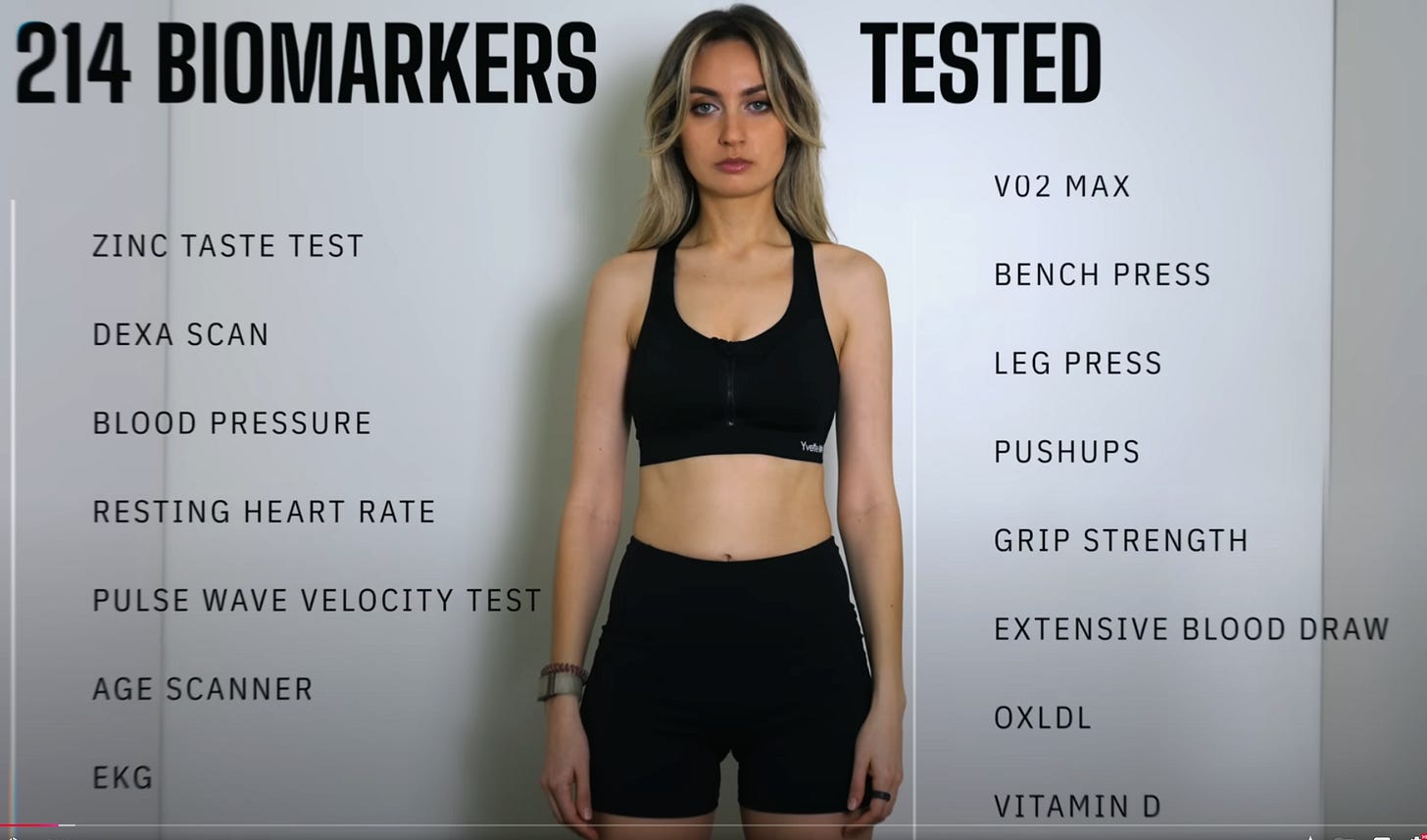

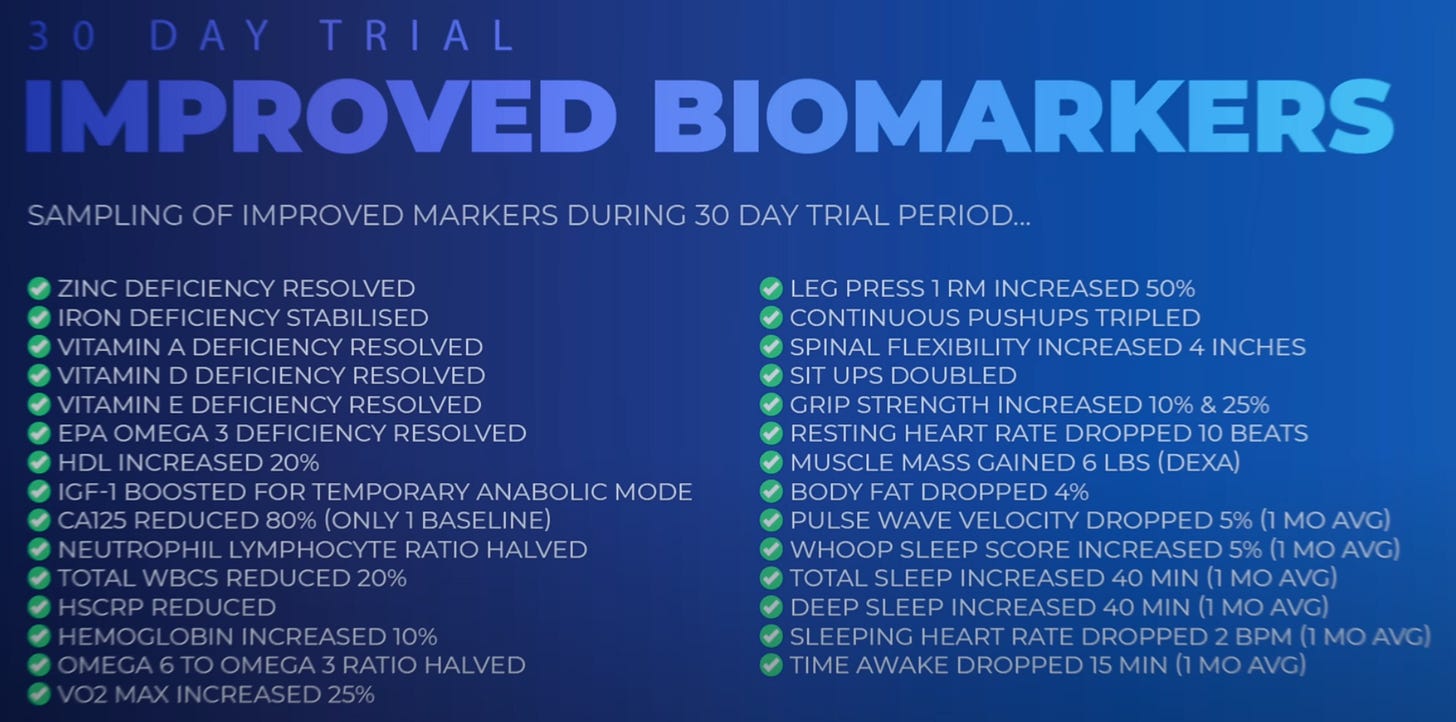


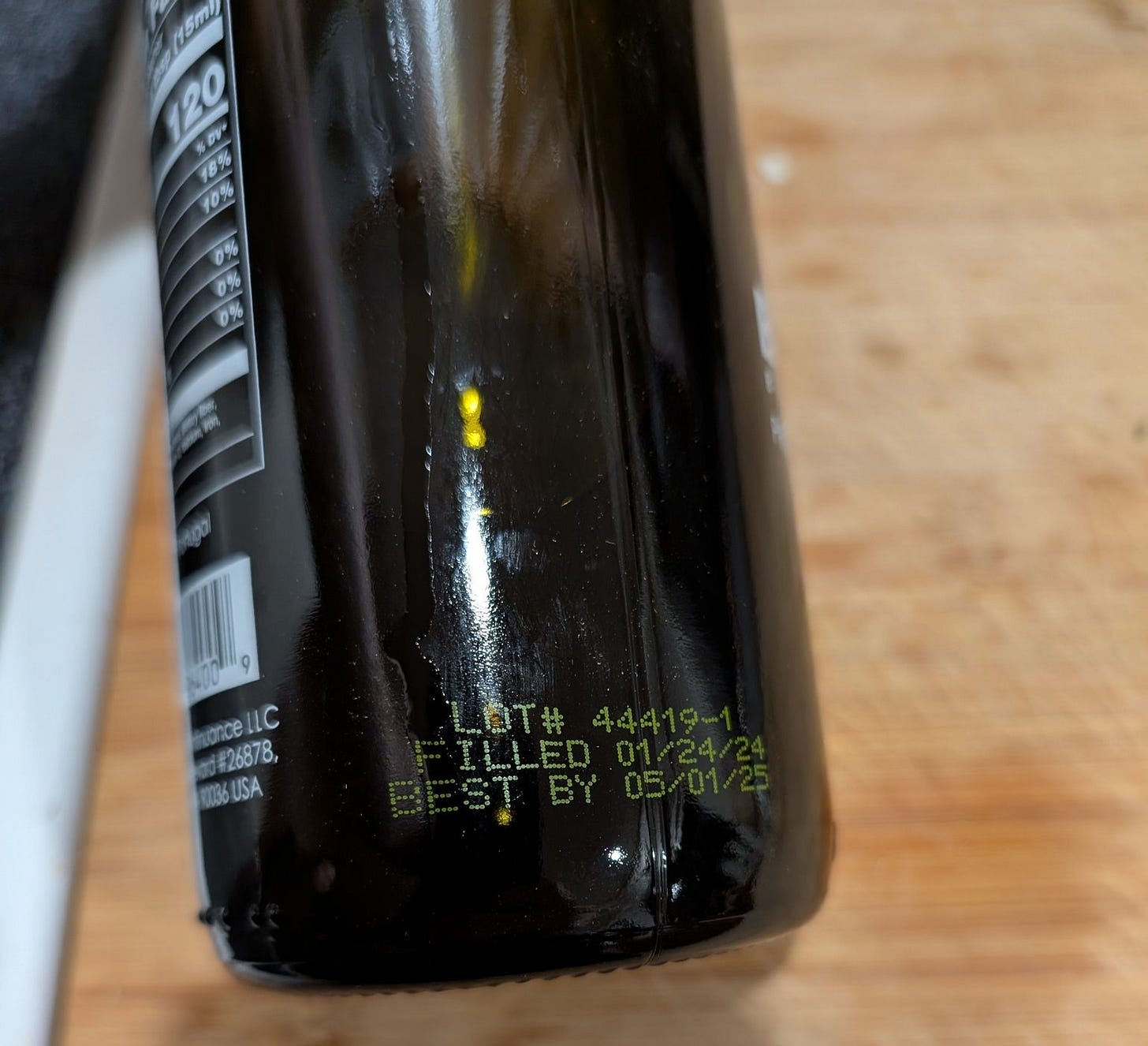


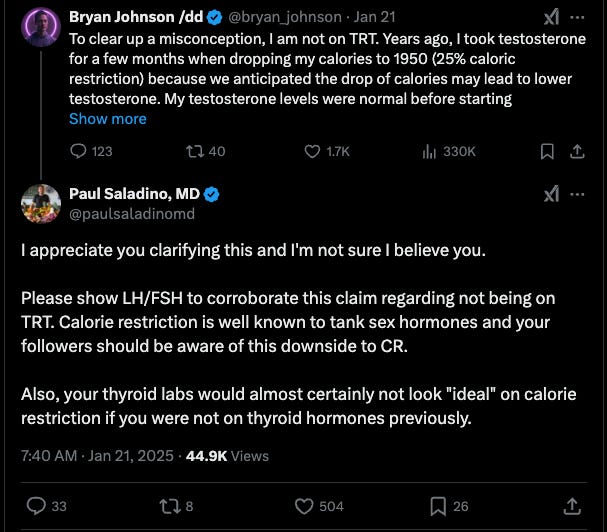















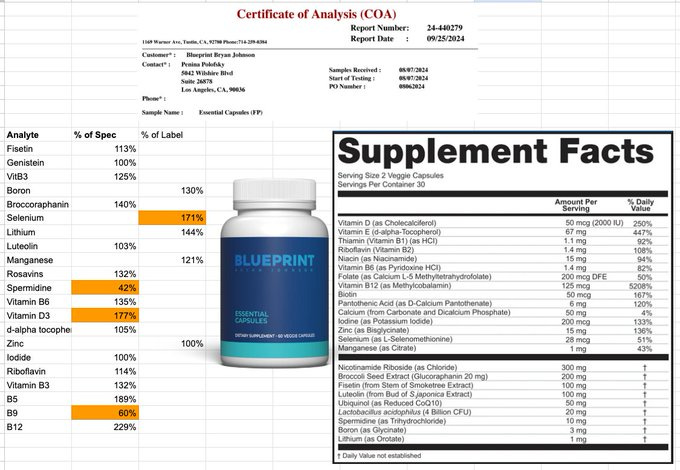



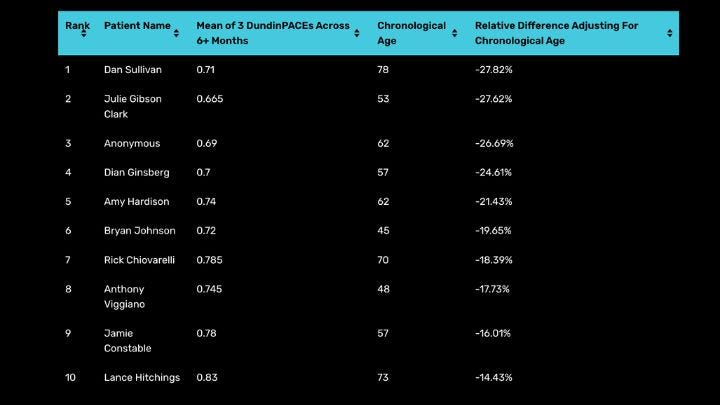




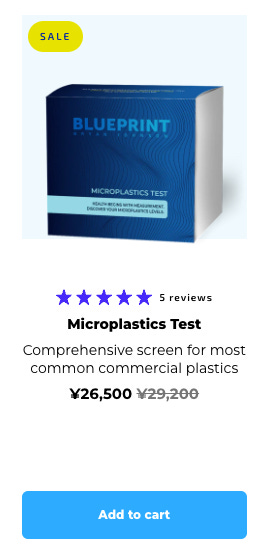


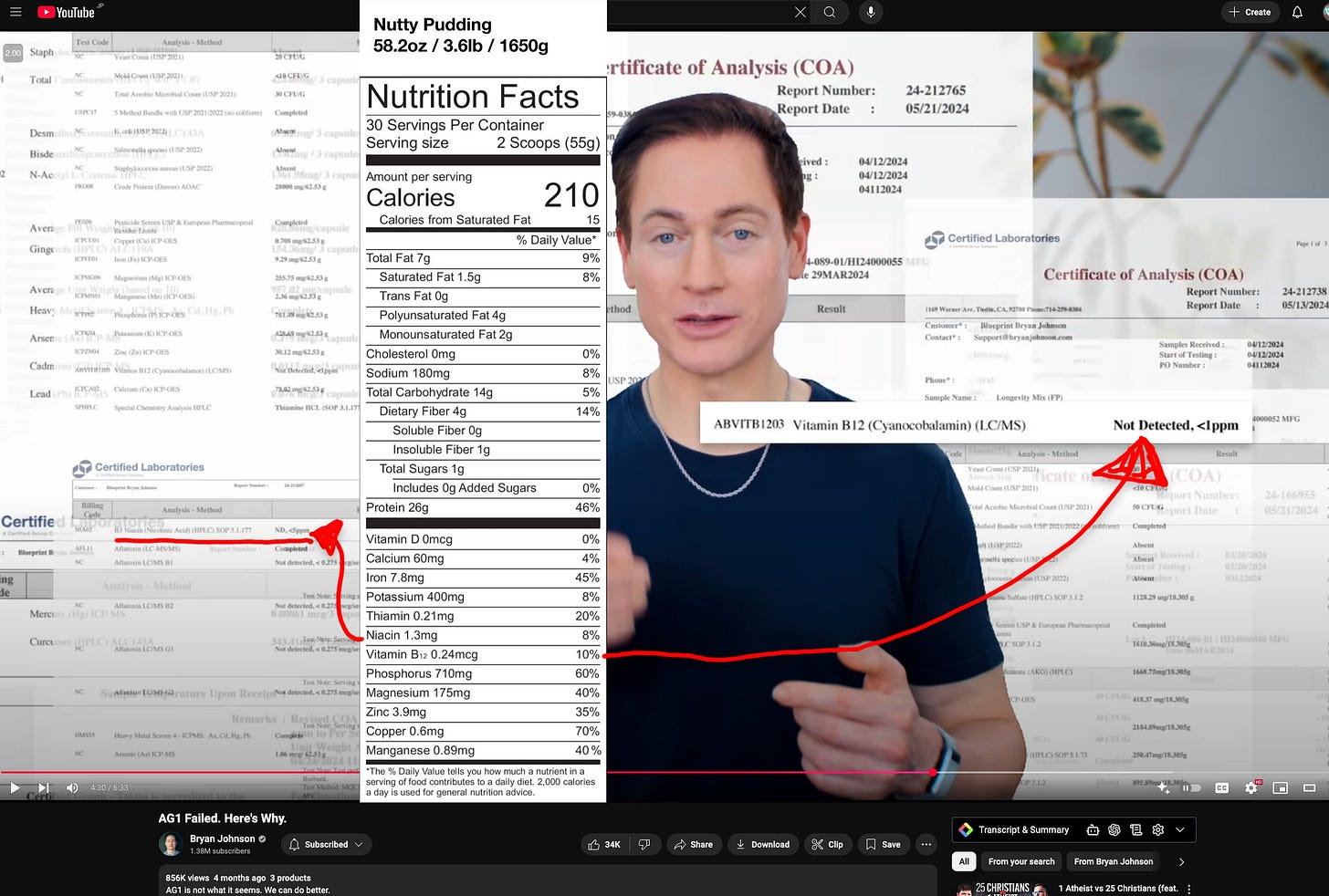

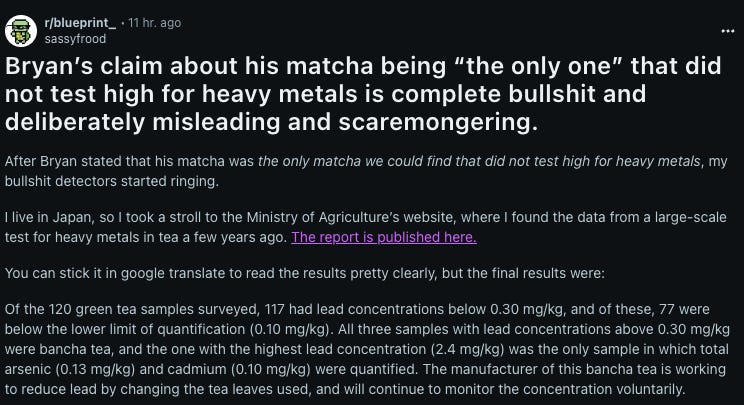

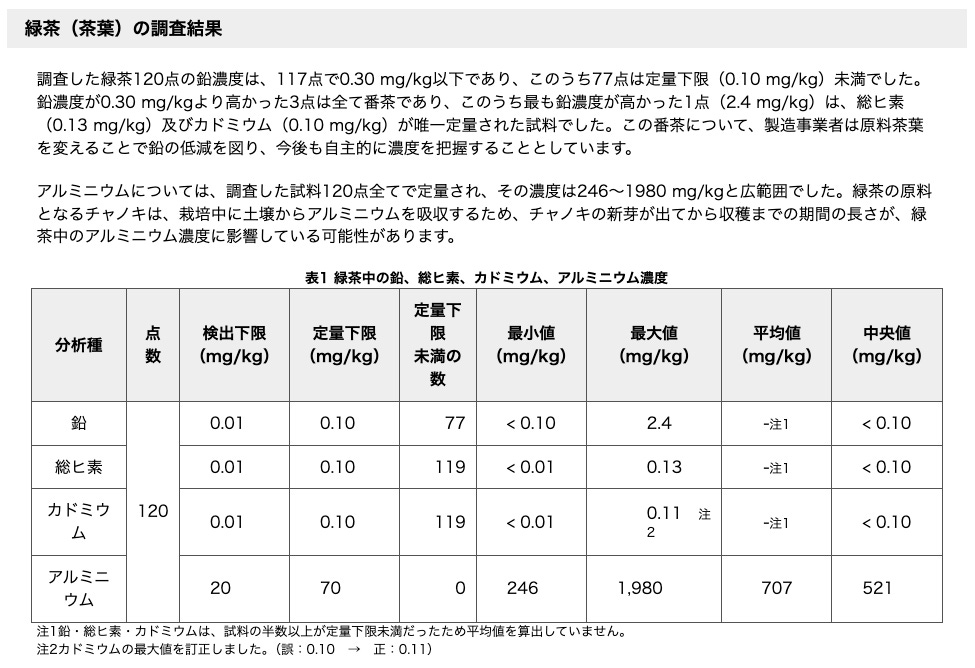





Hi everyone. Bryan here 👋. Don't fall for Joseph’s trickery. He again distorts and contorts information. It’s clickbait.
Addressing all falsehoods would be endless and unproductive. Much of his content has gone stale as I’ve refuted his claims with data, but unlike legitimate journalists, he doesn’t issue corrections. He’s a content farmer.
Here is an example:
⬇️ I share my testosterone levels
⬇️ he accuses me of secretly using TRT
⬇️ I prove him wrong (LH & FSH results)
⬇️ he accuses me of lying
⬇️ I provide evidence with labs
⬇️ he ignores and still says I’m lying
It’s an endless rabbit hole. Joseph uses guilty-by-default tactics to spread conspiracy theories. He’s not an honest critic.
Another example, he says my sleep scores are impossible because of meetings with my CFO in China. I schedule meetings with my CFO when our time zones overlap. Pretty simple.
He repeatedly claims I hide data or cherry-pick results. This is false. I consistently publish full lab reports, historical data, and detailed health protocols openly on X. I even transparently share mistakes. For example, when a recent experiment backfired (a drug that unexpectedly sped up aging), I openly discussed it and adjusted course.
The irony is Joseph claims he wants more transparency, yet he weaponizes my openness. This is exactly the behavior that makes people hesitant to share publicly.
To further eliminate doubt, I published my complete, most recent biomarker panel. It included:
+ 60+ biomarkers
+ most recent results
+ average across 12 months
+ dates for everything
+ my blood draw from 4/1/25
+ the report directly from the lab
+ explanations on all markers
+ areas for improvement
Predictably, Joseph ignored this evidence because acknowledging it would undermine his narrative.
He argues Blueprint is a hidden profit scheme. This couldn't be further from the truth. I sold my previous company for $800M. If money were my motive, I wouldn’t choose to sell olive oil & protein. Our events (summits) run at a loss. I have openly stated that Blueprint is a pain in my ass. The headaches outweigh financial benefits. I fund it because I believe deeply in its value for my health & thousands of others.
Joseph claims we’re withholding BP5000 study data. All participants received their individual results and a summary of aggregate findings. During the study, our team confirmed that FDA regulations prohibit sharing raw study data (even anonymized) when it pertains to dietary supplements or foods, as this may be interpreted as making unauthorized health claims. We have strictly adhered to these regulatory guidelines & have provided scientifically accurate summaries within permissible boundaries.
He accused me of manipulating the Rejuvenation Olympics leaderboard. A third-party lab administers all aging-speed tests, & are the same for everyone: rankings are an average of your best three scores. This is to encourage experimentation. I personally have moved up & down the leaderboard, just like everyone else.
Lastly, Joseph directly benefits from attacking me. He makes Instagram reels to generate views, and to increase his followers and revenue. He isn’t creating this content for a noble cause: this is for self-interest. Joseph doesn’t have your back, he’s looking out for his own.
Who’s funding the months he spent working on these videos? His financial motives are unclear. He's previously faced scrutiny for not disclosing financial ties to the meat industry. I'm openly plant-based but have never imposed this choice on others. You do you.
It’s also amusing that Joseph claims my 8 months of 100% sleep must be fake because I'm an entrepreneur… as if consistently going to bed on time is some impossible feat. He provides no evidence for his claims. Meanwhile, I’ve published my data. I made sleep my #1 priority in life, and everyone in my orbit knows that.
We all know people like Joseph who say untrue things to harm reputations, driven by hidden motives. People who make ‘hit-and-run accusations’ & then don't clean up the mess they created when proven wrong. Hate will get you attention, but that doesn’t make it right.
Defamers don’t shape history; builders do. If you aim to positively impact the world, expect detractors like Joseph. They’re just noise.
Stay strong. I have your back.
Who decides that some biomarker is in good range, by averaging population, by some study, by looking at centenarians, and if biomarkers are there to show ideal health and metabolism it is not biomarkers for longevity, longevity is maybe different, that is different goal.
Maybe low body temperature is good for longevity, we don't know.
I searched some studies on this topic and got confronting conclusions.
Like you say everything he does maybe will do nothing for longevity (but being rich and low stress certainly will do 😁).
And the end if he was to be of better longevity down the line , how we will now why, maybe 95 percent of effects will be that gene therapy on remote island. We will not know.
I live at Mediterranean area, I can get real home made olive oil from people I know , yes that is more expensive than in stores.
It is just that I prefer butter, but I also use olive oil as much as butter.